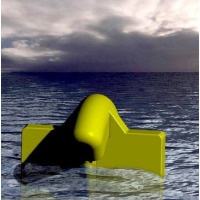Engineers make a splash with their Frog

Designs for a wave energy converter developed by Lancaster University Engineers have been selected for further research as part of a national programme.
PS Frog a device capable of converting natural energy of sea waves into electricity for use in the home or industry – has been selected as one of eight marine energy prototypes for further development.
Over the last two decades researchers at Lancaster University’s Renewable Energy Group have been fine-tuning Prof Michael French's original design idea but until now limited research has been done into the actual costs of producing a full-scale model.
The Carbon Trust - an independent company funded by Government, which seeks to reduce carbon emissions – has selected Lancaster’s PS Frog as one of eight wave energy converters for more detailed work on costs.
The Marine Energy Challenge is a major new programme to assess the potential for marine energy devices to achieve a competitive cost of electricity generation against other renewable energy sources and fossil fuelled power generation.
The objectives of the Marine Energy Challenge are to:
· Review devices and device concepts in order to establish the potential of wave and tidal devices to become cost-competitive;
· Engage engineering design companies to produce detailed engineering reports, including design drawings, in order to assess wave and tidal viability to a higher degree of accuracy than has been done in the past; and
· In so doing, confirm whether electricity generation costs can be reduced, and if so, to transfer technology, build capacity in the industry, and move device development forward.
In addition, the Marine Energy Challenge will:
· Provide a clearer picture of the cost and performance of the types of device and the fundamentally different methods employed to extract energy from the waves and tides;
· Help to clarify other barriers to commercialisation; and
· Allow an assessment of the UK’s competitive position as a technology supplier.
Senior Lecturer in Engineering George Aggidis of Lancaster University’s Renewable Energy Group said: “We are delighted the PS Frog has been selected for this work. It has been under development at Lancaster for nearly two decades and we are very excited about its future. This funding will enable us to carry out a detailed cost analysis to build up a clear picture of what is would cost to build a full scale version PS Frog, and in the process address a number of relevant to its further development issues.”
The Carbon Trust will be working with eight developers: Clearpower Technologies (WaveBob); Ocean Power Delivery (Pelamis); SeaVolt Technologies (Wave Rider); AquaEnergy (AquaBuOY); Lancaster University (PS Frog); Evelop (Wave Rotor); Embley Energy (Sperboy); Wave Dragon (Wave Dragon).